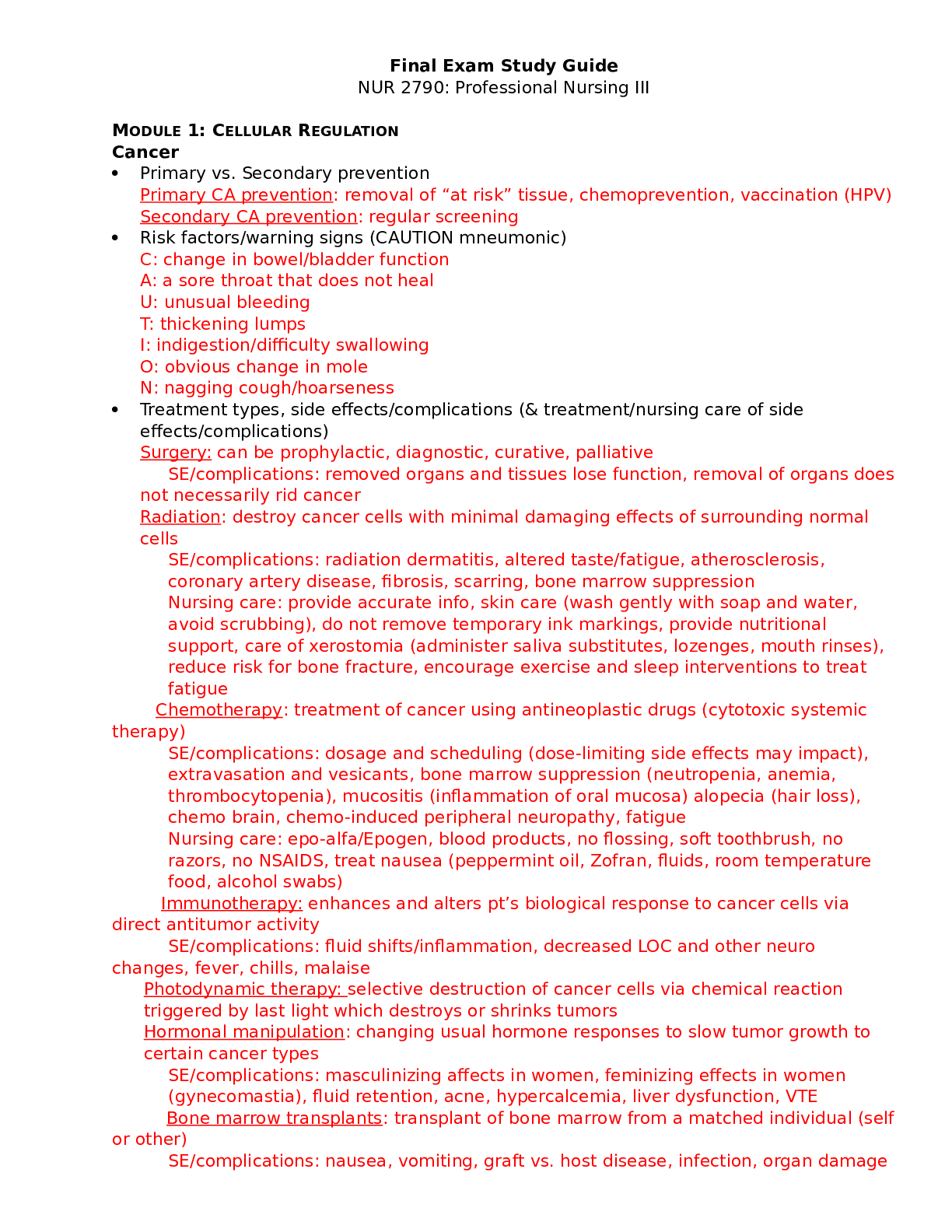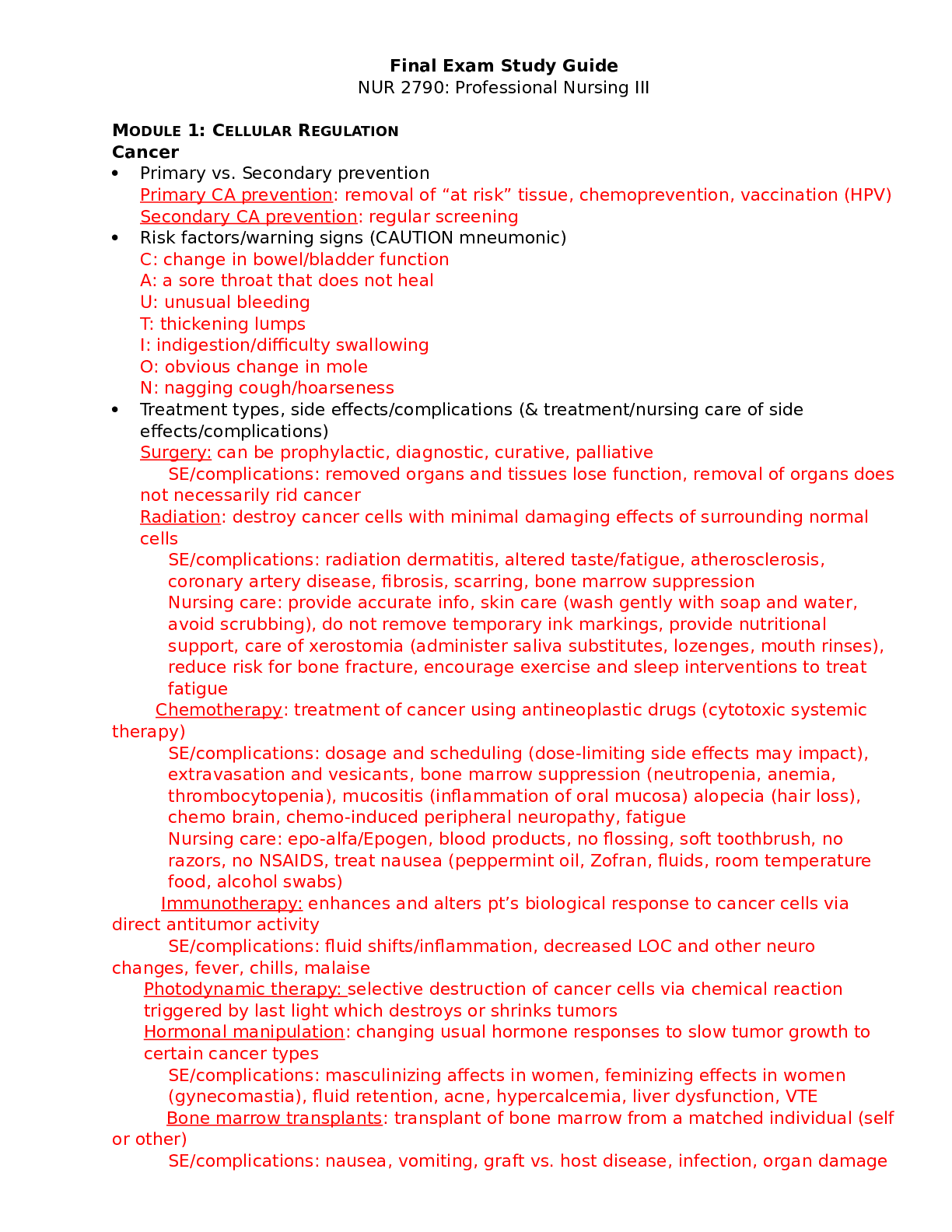MODULE 1: CELLULAR REGULATION
Cancer
Primary vs. Secondary prevention
Primary CA prevention: removal of “at risk” tissue, chemoprevention, vaccination (HPV)
Secondary CA prevention: regular screening
Risk factors/warning signs (CAUTION mneumonic)
C: change in bowel/bladder function
A: a sore throat that does not heal
U: unusual bleeding
T: thickening lumps
I: indigestion/difficulty swallowing
O: obvious change in mole
N: nagging cough/hoarseness
Treatment types, side effects/complications (& treatment/nursing care of side
effects/complications)
Surgery: can be prophylactic, diagnostic, curative, palliative
SE/complications: removed organs and tissues lose function, removal of organs does
not necessarily rid cancer
Radiation: destroy cancer cells with minimal damaging effects of surrounding normal
cells
SE/complications: radiation dermatitis, altered taste/fatigue, atherosclerosis,
coronary artery disease, fibrosis, scarring, bone marrow suppression
Nursing care: provide accurate info, skin care (wash gently with soap and water,
avoid scrubbing), do not remove temporary ink markings, provide nutritional
support, care of xerostomia (administer saliva substitutes, lozenges, mouth rinses),
reduce risk for bone fracture, encourage exercise and sleep interventions to treat
fatigue
Chemotherapy: treatment of cancer using antineoplastic drugs (cytotoxic systemic
therapy)
SE/complications: dosage and scheduling (dose-limiting side effects may impact),
extravasation and vesicants, bone marrow suppression (neutropenia, anemia,
thrombocytopenia), mucositis (inflammation of oral mucosa) alopecia (hair loss),
chemo brain, chemo-induced peripheral neuropathy, fatigue
Nursing care: epo-alfa/Epogen, blood products, no flossing, soft toothbrush, no
razors, no NSAIDS, treat nausea (peppermint oil, Zofran, fluids, room temperature
food, alcohol swabs)
Immunotherapy: enhances and alters pt’s biological response to cancer cells via
direct antitumor activity
SE/complications: fluid shifts/inflammation, decreased LOC and other neuro
changes, fever, chills, malaise
Photodynamic therapy: selective destruction of cancer cells via chemical reaction
triggered by last light which destroys or shrinks tumors
Hormonal manipulation: changing usual hormone responses to slow tumor growth to
certain cancer types
SE/complications: masculinizing affects in women, feminizing effects in women
(gynecomastia), fluid retention, acne, hypercalcemia, liver dysfunction, VTE
Bone marrow transplants: transplant of bone marrow from a matched individual (self
or other)
SE/complications: nausea, vomiting, graft vs. host disease, infection, organ damage
Complementary & Alternative Medicine (CAM)
Types of CAM (mind-body therapy, tai chi, chiropractic care, herbal meds, etc.), goals of
use, and interactions
Mind-body therapies: biofeedback, guided imagery, intercessory prayer, meditation,
relaxation exercise
Biologically-based therapies: herbal therapies (chamomile, garlic, gingko, ginseng,
peppermint, st.john’s wart, vaerin)
Manipulative and body-based therapies: acupuncture, acupressure, chiropractic,
massage, rolfing, shiatsu, tai chi, yoga
Energy therapies: reiki, therapeutic touch
Alternative medical systems: homeopathy (tx of disease with minute drug doses to
activate and illness that then stimulates the body’s normal defense system to eliminate
disease; remedies without chemically active ingredients), naturopathy (the practice of
assisting in the health of patients through the application of natural remedies),
osteopathy (embracing the full spectrum of medicine, including the use of medications
and surgery, in addition to manipulative techniques)
MODULE 2: END-OF-LIFE CARE
Chapter 10: Principles of Emergency and Disaster Preparedness
Palliative vs. Hospice care (goals of each, differientation)
Palliative care: can be any stage of serious or chronic illness, care may be provided
concurrently with curative therapies, care not limited by time periods, care provided by
PCP with potential follow-up vistis
Hospice care: prognosis of less than 6 months to live, initiated when curative tx stops,
60-90 day periods of care, care provided by RNs, social workers, chaplains, and
volunteers
Ethical/legal considerations r/t dying (AD’s, living will, euthanasia, etc.)
Durable power of attorney for health care (DPOAHC): makes decisions about pt’s
healthcare when MD determines pt does not have capacity to make decisions (pt
does not receive info, pt does not evaluate, deliberate and mentally
manipulate info, pt does not communicate a tx preference)
Living will: discusses CPR or code status (must be initiated unless and DNR order
exists, may be violent and painful), intubation/artificial ventilation, artificial
nutrition/hydration
“Five wishes”: identification of decision maker (DPOAHC), identification of
treatments the pt does/does not want, comfort level expectations, how they
want to be treated, what the pt wants loved ones to know
Active euthanasia: use of medications or tx that purposefully causes pt’s death
(physician assisted suicide)
Passive euthanasia: discontinuation of one or more therapies that may prolong life
Voluntary stopping of eating and drinking (VSED): refusal to eat or drink in order to
hasten death by competent pt with terminal illness
S/Sx of end-of-life
Lack of heartbeat, absence of spontaneous respirations, irreversible brain
dysfunction
Weakness, anorexia, changes in cardio function (cool, mottled cyanotic extremities,
decreased BP, heart rate will increase-irregular-brady-asystole), dyspnea (cheyne�stokes), changes in GU (incontinence, decreased UO), changes in LOC (sleeping,
restless, anxiety, lethargy)
MODULE 3: TISSUE INTEGRITY
Chapter 10: Principles of Emergency and Disaster Preparedness
Read More


